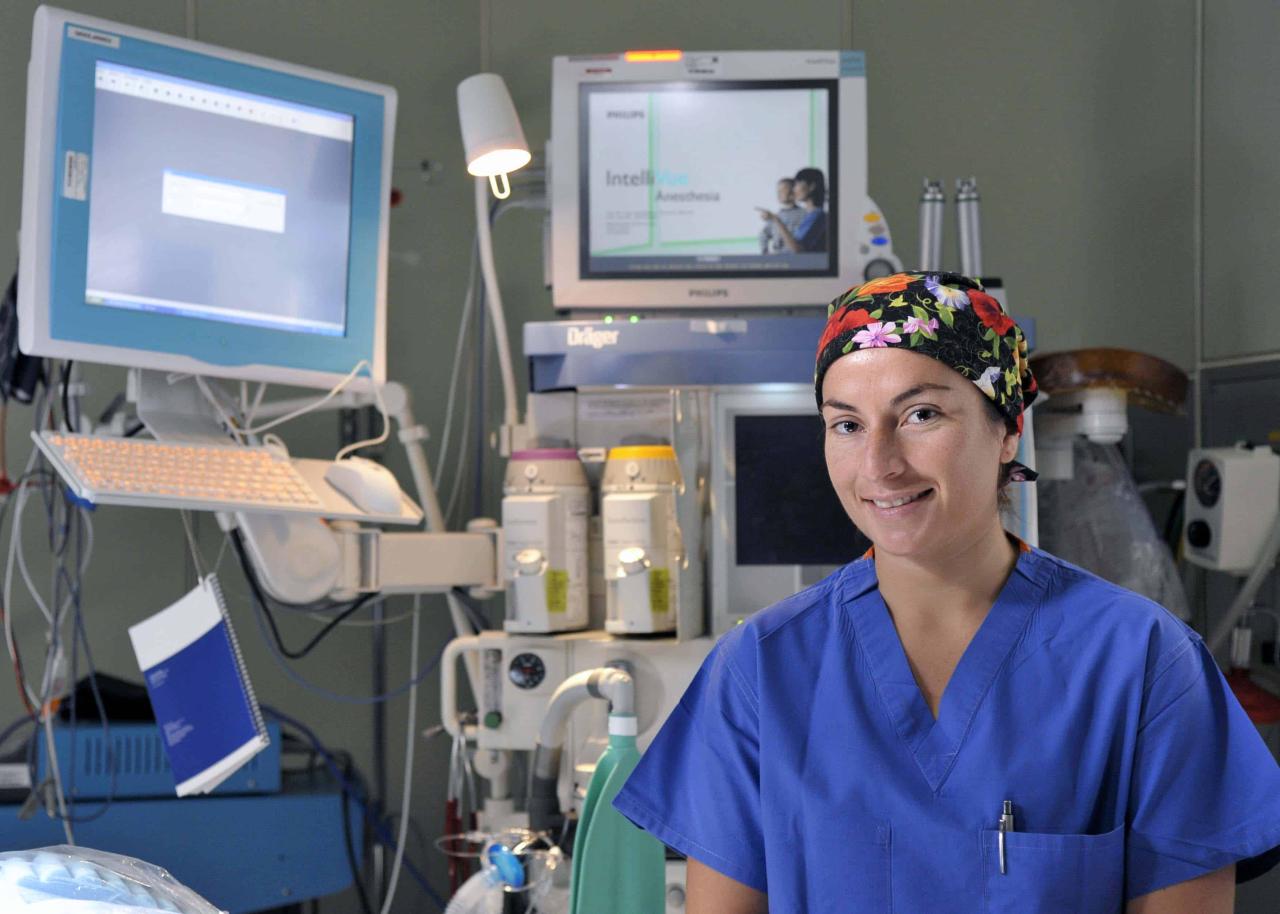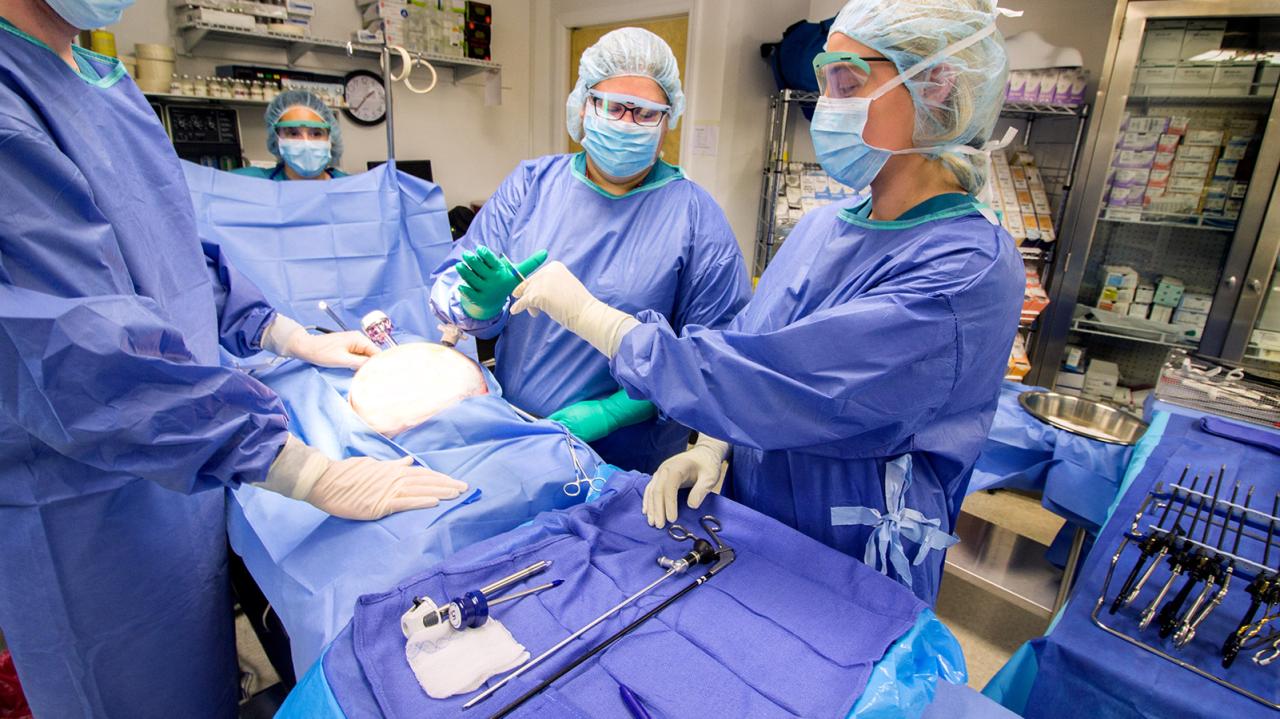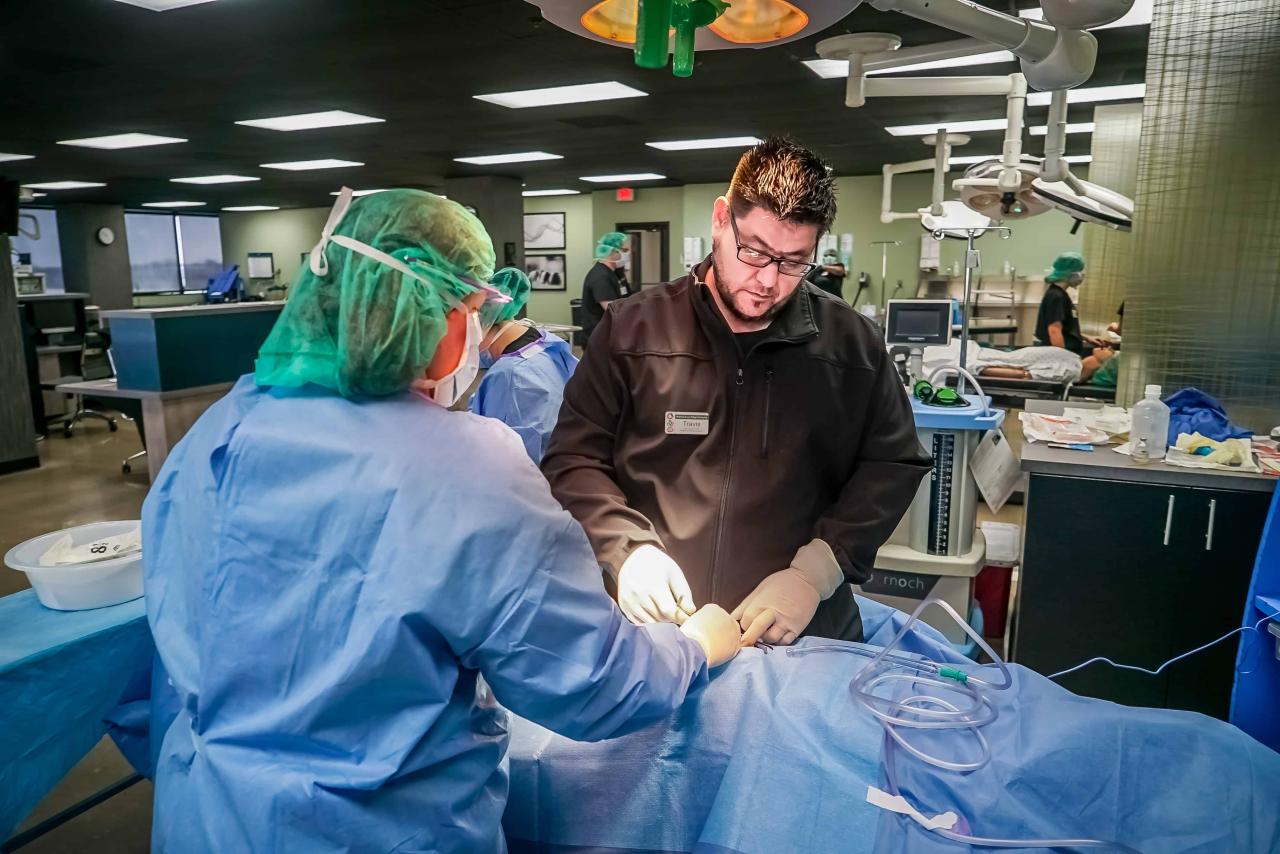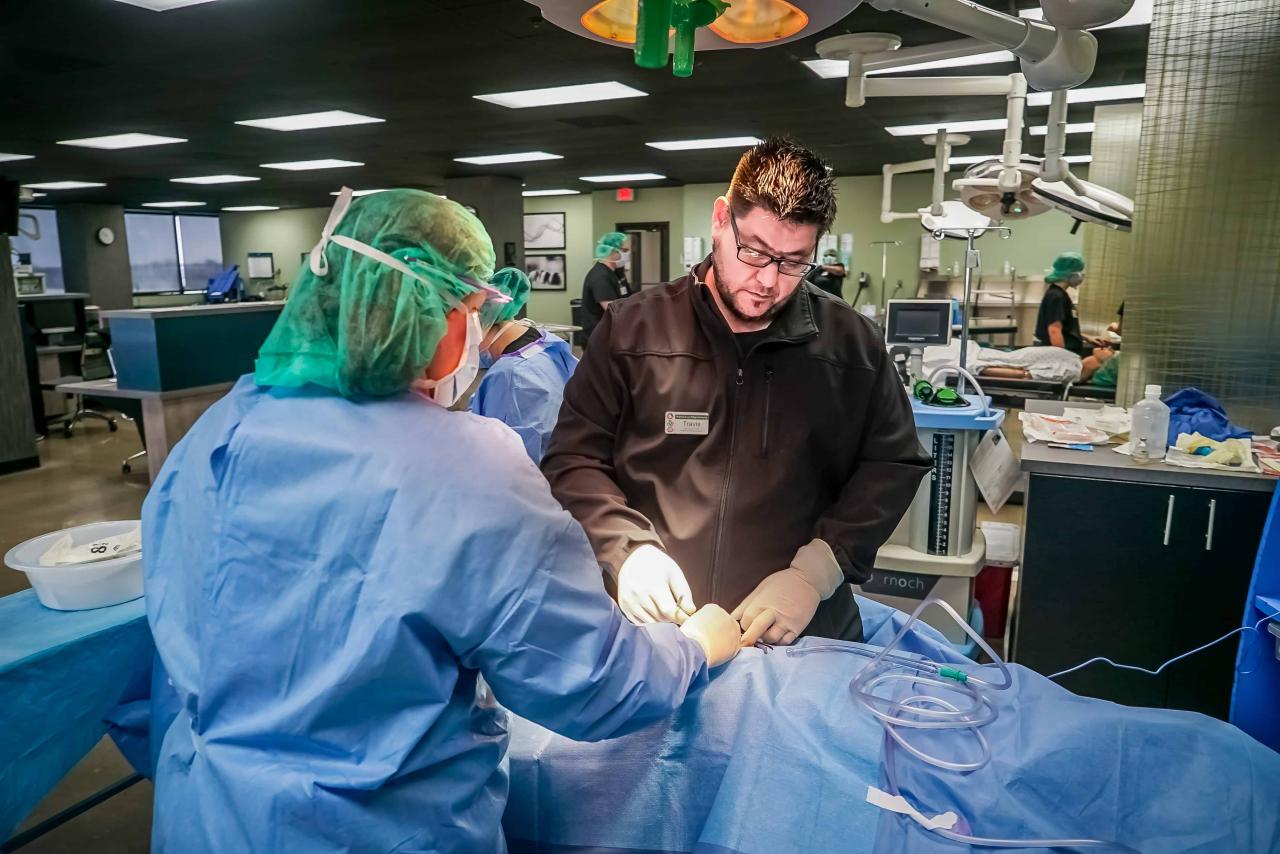Surgical tech programs near me? Finding the right program can feel overwhelming, but it doesn’t have to be. This guide breaks down everything you need to know, from understanding different program types and locations to navigating costs and career prospects. We’ll explore certificate, associate’s, and bachelor’s degree options, helping you choose the path that best fits your goals and schedule.
So you’re looking into surgical tech programs near me? That’s awesome! It’s a demanding but rewarding field. However, if you’re also curious about tech careers, check out this resource on the full stack developer career path and required skills to see if that path might be a better fit for you. Ultimately, the best career path depends on your interests and skills, so research both surgical tech programs and coding options before deciding.
Get ready to discover the perfect surgical technology program for your future!
We’ll cover key aspects like accreditation, financial aid options, and admission requirements. Learn about the exciting career opportunities awaiting surgical technologists and how to make your application stand out. This guide is your roadmap to a successful career in surgical technology.
Understanding Your Search: “Surgical Tech Programs Near Me”
Searching for “Surgical Tech Programs Near Me” reveals a user’s immediate need for location-specific information about educational opportunities in surgical technology. This search implies a strong interest in pursuing a career as a surgical technologist and a desire to find a program conveniently located.
User Needs and Profiles
Users searching this phrase typically fall into several categories: high school graduates exploring career options, individuals seeking career changes, or professionals aiming for advancement within the healthcare field. They may prioritize factors like program reputation, proximity to their home or work, program cost, and available financial aid.
Factors Influencing Location-Based Searches
Location is paramount. Commuting distance, proximity to family, and the presence of potential employers in the area significantly influence program choices. The availability of clinical rotations at reputable hospitals or surgical centers within a reasonable distance is another key consideration.
Types of Surgical Technology Programs
Surgical technology programs are offered at various levels, each with its own curriculum, duration, and career pathways. Understanding these differences is crucial for making an informed decision.
Program Types, Curriculum, and Career Pathways

The three main types of programs are certificate, associate’s degree, and bachelor’s degree programs. Certificate programs are the shortest, focusing on practical skills. Associate’s degree programs provide a broader education, including more theoretical knowledge. Bachelor’s degree programs offer the most comprehensive education, often including advanced coursework and research opportunities. Career paths vary depending on the level of education attained.
Thinking about surgical tech programs near me? It’s a great career path! But before you start researching schools, check the weather; a major Winter storm warning issued for Kansas City, as weekend travel to might affect your plans for visiting campuses or attending open houses. So, factor in travel safety when you plan your next steps in finding the right surgical tech program for you.
| Program Type | Duration | Curriculum Highlights | Career Prospects |
|---|---|---|---|
| Certificate | 9-12 months | Surgical instrumentation, sterile techniques, anatomy and physiology | Surgical Technologist (entry-level positions) |
| Associate’s Degree | 18-24 months | Expanded anatomy and physiology, medical terminology, surgical procedures, patient care | Surgical Technologist (broader range of positions), Surgical Assistant |
| Bachelor’s Degree | 36-48 months | Advanced surgical techniques, leadership principles, research methods, healthcare management | Surgical Technologist (leadership roles), Surgical Services Manager, Educator |
Locating Surgical Technology Programs
Finding programs geographically involves using a variety of online resources and search strategies. Ensuring accreditation is vital to confirm the program meets established standards.
Finding Accredited Programs
Several organizations accredit surgical technology programs. Verifying accreditation ensures the program meets nationally recognized standards for quality education and training. The Commission on Accreditation of Allied Health Education Programs (CAAHEP) is a primary accrediting body.
Search Engines and Directories

Utilize online search engines like Google, Bing, and specialized healthcare career websites. Professional organizations such as the Association of Surgical Technologists (AST) often maintain directories of accredited programs.
Program Accreditation and Certification
Accreditation and certification are crucial for surgical technologists. Accreditation ensures program quality, while certification demonstrates competency and enhances career prospects.
Importance of Accreditation
Accreditation signifies that a program meets rigorous standards set by recognized accrediting bodies. This ensures graduates possess the necessary knowledge and skills to perform their duties safely and effectively.
Accrediting Bodies and Certification Benefits, Surgical tech programs near me
CAAHEP is a prominent accrediting body. National certification, such as the Certified Surgical Technologist (CST) credential offered by the NBSTSA, demonstrates competency and increases employment opportunities.
Program Costs and Financial Aid: Surgical Tech Programs Near Me
The cost of a surgical technology program varies widely. Understanding the potential expenses and exploring financial aid options is essential for budgeting and planning.
Typical Program Costs
Tuition, fees, books, and supplies contribute to the overall cost. Costs vary significantly depending on the institution, program type, and location. Expect to budget for tuition, fees, textbooks, and potential living expenses.
Financial Aid Options
Federal student loans, grants, scholarships, and institutional financial aid are all potential avenues to help finance your education. Explore options offered by the school, government programs, and private organizations.
Sample Budget
A sample budget might include: Tuition ($10,000 – $25,000), Fees ($500 – $2000), Books and Supplies ($500 – $1500), Living Expenses (variable, depending on location and living arrangements).
Program Admission Requirements
Admission requirements vary across programs and institutions. Understanding these requirements is essential for successful application.
Common Admission Requirements
Common requirements include a high school diploma or GED, minimum GPA, prerequisite courses (like biology and anatomy), and possibly an entrance exam. Some programs may also require interviews or background checks.
Requirements Across Program Types

Certificate programs generally have less stringent requirements than associate’s or bachelor’s degree programs. Bachelor’s degree programs often require a higher GPA and more extensive prerequisite coursework.
Importance of Prerequisites and GPA
Prerequisite courses demonstrate foundational knowledge, while GPA reflects academic preparedness and potential for success in the program.
Looking for surgical tech programs near me? Finding the right school can be a big decision, kind of like choosing the right batting strategy in a cricket match. Speaking of which, did you see that amazing game where Rickelton double-century, Verreynne fifty propel SA to 429 by an incredible score? Anyway, back to surgical tech programs – research your options carefully to find the best fit for your career goals.
Career Outlook for Surgical Technologists
The job market for surgical technologists is generally positive, driven by increasing demand for surgical procedures and healthcare services.
Job Market Outlook and Influencing Factors
Employment opportunities vary by geographic location and specialization. Areas with a high concentration of hospitals and surgical centers tend to offer more opportunities. Specialization in specific surgical areas can also enhance career prospects.
Job Responsibilities and Work Environments
Surgical technologists prepare operating rooms, assist surgeons during procedures, and maintain sterile conditions. They work in a variety of settings, including hospitals, ambulatory surgical centers, and physician’s offices.
Illustrative Examples of Program Curricula
A typical surgical technology program curriculum integrates didactic (classroom) and clinical (hands-on) learning. The progression of skills and knowledge builds throughout the program.
Sample Course Modules
A program might include modules on surgical instrumentation, sterile techniques, anatomy and physiology, surgical procedures (e.g., laparoscopic surgery, cardiovascular surgery), patient care, and medical terminology. Clinical rotations provide practical experience in various surgical specialties.
Skill and Knowledge Progression
Students start with fundamental concepts and progress to advanced techniques. Early modules focus on basic skills, while later modules delve into complex procedures and specialized areas. Clinical rotations allow students to apply their knowledge and develop proficiency in a real-world setting.
Comparison of Top Programs (Fictional Examples)
This section compares fictional, high-ranking surgical technology programs to illustrate factors to consider when choosing a program. Remember to research actual programs for accurate information.
| Program Name | Accreditation | Curriculum Highlights | Estimated Cost |
|---|---|---|---|
| Northwood Surgical Institute | CAAHEP | Emphasis on minimally invasive surgery | $18,000 |
| Central Valley Surgical Tech Academy | CAAHEP | Strong clinical rotations at multiple hospitals | $22,000 |
| West Coast Surgical Training Center | CAAHEP | Focus on robotic surgery techniques | $20,000 |
Last Recap
Launching a career as a surgical technologist is an exciting step, and finding the right program is crucial. Remember to prioritize accreditation, carefully consider program length and curriculum, and explore financial aid options. By researching your options and planning strategically, you’ll be well-prepared to embark on this rewarding career path. Good luck on your journey!
FAQ Explained
What’s the difference between a certificate and an associate’s degree in surgical technology?
Certificate programs are shorter and more focused, often providing a quicker entry into the field. Associate’s degrees offer a broader education and potentially more career advancement opportunities.
How much does a surgical technology program typically cost?
Costs vary widely depending on the program type, location, and institution. Expect tuition, fees, and supplies to add up, but explore financial aid options like loans, grants, and scholarships.
What are the job prospects for surgical technologists?
The job outlook for surgical technologists is generally positive, with increasing demand in many areas. However, job availability can fluctuate based on geographic location and specialization.
Do I need prior healthcare experience to apply?
Most programs don’t require prior experience, but some prefer or require relevant volunteer or shadowing hours. Check specific program requirements.
